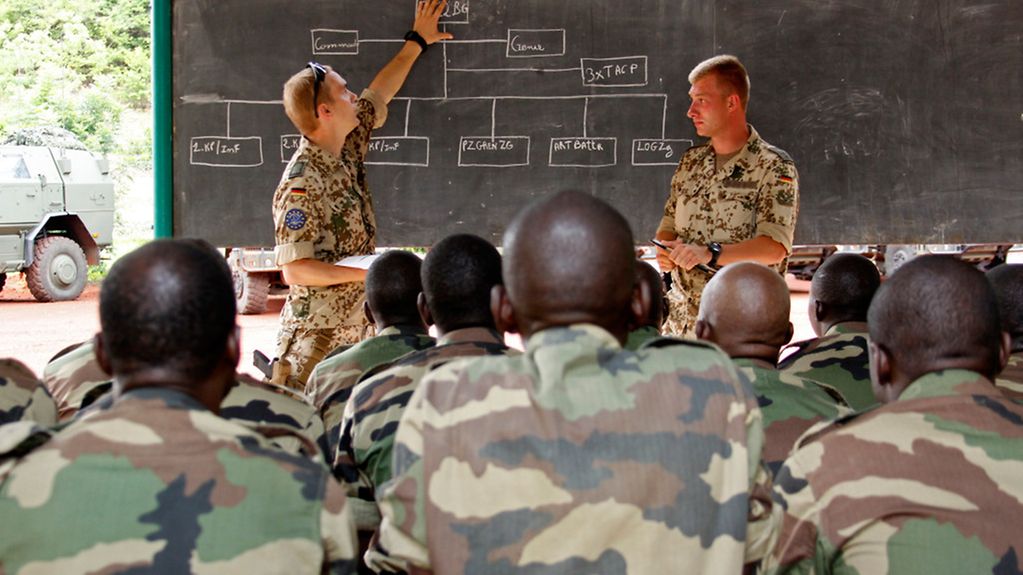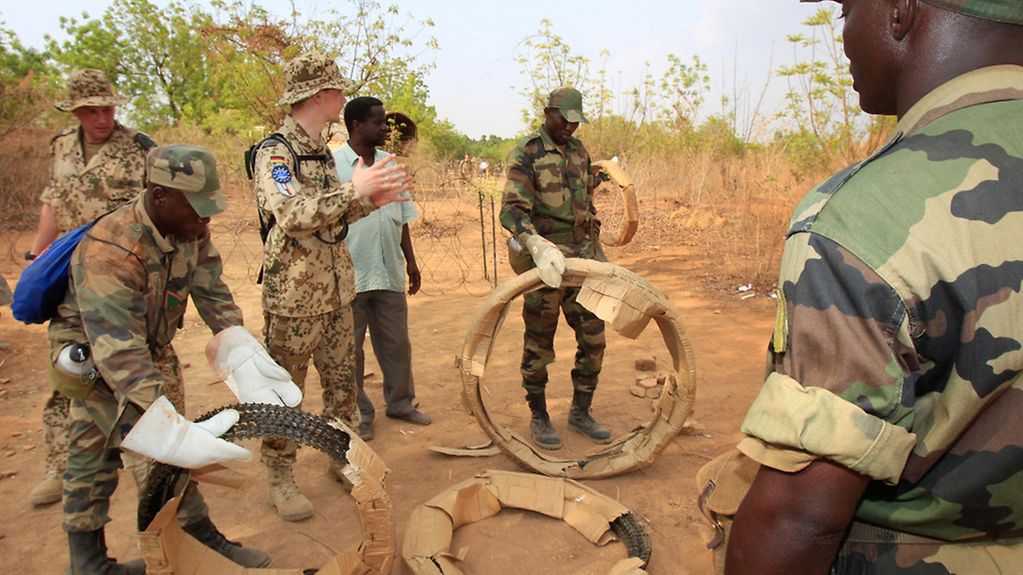German Bundestag approves Mali mandate
The German Bundestag has voted by a clear majority to approve the mandate for the training mission in Mali,proposed by the Cabinet. In future the Bundeswehr will also train Malian soldiers in Gao and Timbuktu.
4 min reading time

In future up to 300 Bundeswehr soldiers are to be assigned to the EUTM in Mali
Photo: Bundeswehr/Bier
The mandate provides for a reduction in German troops but embraces additional places of deployment.
The ceiling on troops provided as part of the European Union Training Mission (EUTM) in Mali has been reduced from 350 to 300 following the vote of the German Bundestag. The troops deployed will no longer provide training only in the capital, Bamako, but also in northern Mali. The training mission has been extended until 31 May 2017 as approved by the Bundestag.
The geographical scope of the mission will be extended up to the arc of the River Niger, and will thus include the cities of Gao and Timbuktu, which are important bases for Mali’s armed forces.
Fewer soldiers needed
Germany provides one of the largest contingents of troops for the European Union Training Mission in Mali. Last July the Bundeswehr took over the command of the EU Training Mission and provided the Mission Commander. In July 2016, the command of the mission will pass to Belgium. This will make it possible to further reduce the ceiling on troops.
Rapprochement in Mali
Recently Mali has made progress with its peace process. The parliamentary elections held at the end of 2013 marked a return to constitutional order in the wake of the military putsch in 2012. Negotiations between the Malian government and the separatist rebel organisations led in May and June 2015 to a peace agreement. Algeria brokered the deal with international support.
Nevertheless Mali is still going through a fragile phase of stabilisation. The deeply rooted distrust among the parties to the conflict, and armed clashes between rival Tuareg groups have stalled peace efforts. Since late 2015, the ceasefire between rebels, militia and the government has held.
The mission is based on the European Council Decision 2016/446/CFSP of 23 March 2016 in conjunction with the United Nations Security Council Resolution 2227 (2015) of 29 June 2015.
International support still needed
Since international efforts were launched, the humanitarian situation in Mali has improved, but there is still no unhindered access to all regions for humanitarian aid and development cooperation.
In the meantime, about 80 per cent of internally displaced persons have been able to return to their homes. Some 130,000 refugees from Mali are, however, still living in neighbouring countries. And the process of reconciliation is still overshadowed by attacks perpetrated by Islamist groups. This makes it important to further improve the military capacities of Mali’s armed forces. In future they are to be able to defend their country against terrorist threats.
Focus of Germany’s Africa policy
The situation in Mali is closely linked to problems throughout the Sahel region. Violent extremism, terrorism and fragile states are hampering development. They are a destabilising factor for the entire region.
This could impact strongly on Europe in the medium term. Germany has a strong interest in fighting terrorism, organised crime and impoverishment along with our European and international partners.
Mali is a focus of the German government’s security policy engagement in Africa. The EUTM Mali is one important element of its bilateral and multilateral support to bring stability to Mali.
Spotlight on training

German soldiers from an Armoured Engineer Company train Malian soldiers
Photo: Bundeswehr/Bienert
German troops are primarily training Malian troops and the security forces of the G5 Sahel nations (Mauritania, Mali, Niger, Burkina Faso and Chad). They are also involved in leadership and planning duties, supervision at EUTM and medical support. Advisory services are being delivered to Mali’s Ministry of Defence and the operational command staff of Mali’s armed forces.
German troops also involved in supporting the United Nations Multidimensional Integrated Stabilization Mission in Mali (MINUSMA).
There is to be no tactical mentoring or direct support for Mali’s armed forces in combat missions, or any support of this sort for MINUSMA by the European Union Training Mission (EUTM).
Supporting French partners
The UN is involved in Mali alongside the EU. Germany is supporting the United Nations Multidimensional Integrated Stabilization Mission in Mali (MINUSMA), with a contingent of up to 650 soldiers. The German Bundestag approved this substantial German contribution at the end of January this year.
The core tasks of MINUSMA include supporting ceasefire agreements between the parties to the conflict and fostering security and protection for civilians. Support is also to be provided for national political dialogue and national reconciliation.
The German military contribution to MINUSMA consists of air transport capabilities and mid-air refuelling services to support the French forces authorised by UN Security Council resolutions.
German military and civilian assistance
Parallel to the military mission, the European Union is also involved in a civilian mission to provide training and advisory services for the internal security sector. Germany is providing the Head of the Mission, other experts and police offices for the civilian EU Capacity Building Mission Mali (EUCAP Sahel Mali).
This mission is an integral part of the comprehensive European Union approach in the Sahel region and is part of the EU’s "Strategy for Security and Development in the Sahel" adopted in 2011.
At bilateral level too, Germany is actively involved in Mali, where projects are being implemented within the framework of civilian crisis prevention and the rule of law.
German development cooperation, with its priority areas decentralisation and good governance, sustainable and productive agriculture, and water supply and sanitation, is making a significant contribution to Mali’s future. Peace and development work complement the security and foreign policy engagement of the German government, as part of a networked approach.